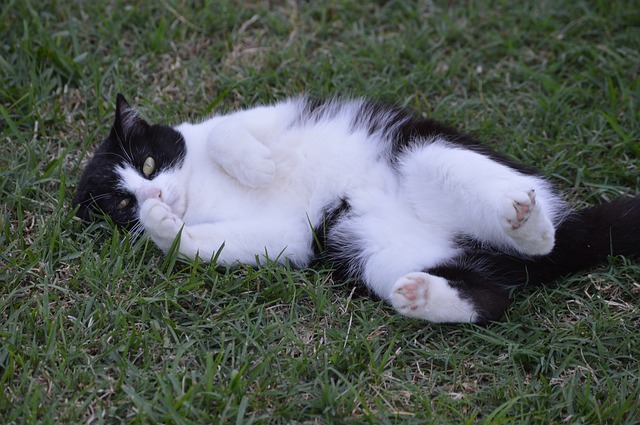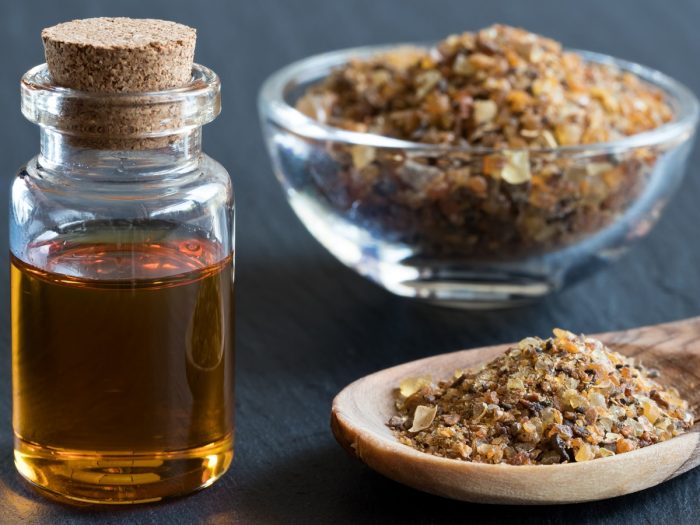Whether you love history and religion or simply enjoy reading about medicinal plants, you have probably come across myrrh.
This powerful plant extract has been around for millennia. In the times of Jesus, it was among the precious gifts given to kings. In ancient times, humans used it to treat a wide range of diseases.
To date, myrrh finds many benefits in our lives. It has a smoky and sweet scent making it great as a fragrance.
Cooks also utilize its deep aroma to add flavor to food.
Most importantly, myrrh has therapeutic properties. It can help not only you but your pets to stay calm amid stressful situations.
But is it really safe for your feline friends? We have a guide that answers this question plausibly.
What Is Myrrh?
Myrrh is a special resin extracted from a group of trees classified under the genus Commiphora. These trees are native to the Middle East and Northern Africa.
It is a viscous and yellow-white liquid flowing down from the barks of these trees. The barks can also be cut apart to intentionally harvest the resin.
After harvesting, the liquid is air-dried until it hardens into a reddish-brown substance with white patches.
For centuries, myrrh was used for its incredible medicinal purposes. According to Medical News Today, the sap can act as an antioxidant, anti-cancer drug, treatment for neuropathic pain, and reduce inflammation associated with rheumatoid arthritis.
Myrrh is also used to treat coughs, indigestion, congestion, ulcers, asthma, joint pain, hemorrhoids, and to maintain healthy skin.
Myrrh oil extracted from the myrrh resin is also quite beneficial. Ancient Egyptians used it to embalm pharaohs. It kills microorganisms that cause the decaying of the body thus keeping it safe for longer.
Myrrh oil, along with Frankincense, was also used to purify the air in places of worship in the first century.
Due to its potent antimicrobial properties, myrrh oil has also been shown to support oral health, treat skin sores, combat swelling and pain, kill certain parasites, among other uses.
Is It Poisonous to Cats?

While they are very useful, essential oils can be harmful to our dear pets. They contain certain substances that felines cannot metabolize.
Without being metabolized, these substances can overwhelm a cat’s system causing serious harm to her.
Thankfully, not all essential oils are poisonous to pets. Where does myrrh fall into?
To answer this question properly, we have to look at the compounds that make up myrrh.
According to this study published on the US National Library of Medicine National Institutes of Health, the resin constitutes calcium, phosphorous, magnesium, chromium, chlorine, scandium, and bromine. These are the elements present in large amounts.
Organic constituents include curzerene, limonene, isocericenine, sphatulenol, myrcenol, germacrene B, and beta selinene.
Most of these constituents are 100% safe for your kitty. Only a few such as limonene,beta selinene, and spathulenol can be a little toxic for your kitty.
Limonene is an organic compound contained in citrus fruits such as lemons, oranges, and grapefruits.
According to Pet Poison Helpline, this substance can have adverse effects on cats. It can trigger gastrointestinal upsets if consumed in large quantities.
Some cats can also experience skin irritation if they come in contact with the resin and its oil.
Beta selinene and spathulenol can also be harmful to a cat. These are similarly found in lemons and other citrus fruits and can cause upsets and irritations for a cat.
Symptoms of Poisoning
In case your cat ingests or rubs her body against myrrh oil, she may suffer the following symptoms. The severity depends on the amount consumed or applied.
- Excessive drooling
- Shaking episodes
- Tremors
- Dribbling
- Lethargy
- Depression
- Vomiting
- Diarrhea
If you notice any of these symptoms, contact your vet immediately. They should be able to give you first-air techniques for the cat.
If the poisoning is severe, they will ask you to rush the pet to the clinic or come to where you are.
The Silver Lining…

While myrrh contains some toxic substances, it is not deadly for your cat. The reason is that these compounds are in very small percentages.
Your cat will have to ingest copious amounts of the extract and oil to induce any symptoms of poisoning.
As a matter of fact, myrrh is not among the toxic essential oils according to major bodies including Cats Protection and Pet Poison Helpline.
The fact that these institutions haven’t listed it in their toxic oils list means something.
Although myrrh has some toxic compounds, their quantities are insignificant to cause real harm.
Safety First
Cats are some of the most curious pets. They love to explore their surroundings, often using their mouths and noses.
Having a bottle of myrrh in open spots is risky. Your cat may reach out and sample whatever is in there.
If she likes the taste and ingests a whole lot of it, she may start to exhibit symptoms of poisoning. Keep the product as far away from your kitty as possible.
If you must use myrrh as a fragrance or utilize its aroma for healing, take caution around your kitty.
Cats have extremely sensitive noses meaning they can pick up on smells more than humans.
Avoid spraying myrrh directly on your space. Instead, use diffusers to keep the risk lower.
While at it, ensure your windows are open so that the cat can flee to safety if the smell gets overwhelming.
Closing Thoughts
From treating pain and inflammation to lifting your mood and making your house smell great, myrrh is Nature’s miracle.
Its healing benefits can be utilized for both human beings and pets.
Unless your cat takes a large amount, myrrh is safe around her.
Keep the mentioned safety tips in mind and everyone will be happy.

Hi! I am Eleanor Price. I started this website after my cat, Louie, almost died from a case of botulism (a type of food poisoning often caused by bacteria that grow on food items). Turned out that my cat’s diet was the problem. I have made it my duty to provide the best information and recommendations about everything cat lovers need to know about their felines’ health and wellbeing. My goal is to find the most informative content on anything feline-related and share it with fellow hardworking kitty lovers.

